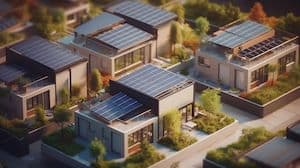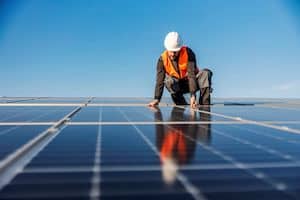Navigating Solar Panel Installation: Costs, Savings, And Financial Incentives

If you’re a homeowner or a landlord considering joining the green revolution by installing solar panels, understanding its financial implications is an important first step. This article will help you navigate the costs, the potential savings, and the financial incentives you’re entitled to when you get a solar panel installation.
By understanding these financial aspects and what affects them, you’ll be armed with the information you need to decide if solar power use is the best option for your property.
Solar Panel Installation Costs
When considering solar panel installation, the first question that usually comes to mind is this: how much do solar panels cost? The initial investment varies greatly and depends on the following factors:
- Size of the installation– The larger the system, the higher the cost. However, a larger system could mean more energy generation and potentially more savings in the long run.
- Quality of panels – High-efficiency panels typically have a higher upfront cost but can provide greater energy output and are more durable, which also translates to long-term savings.
- Installation costs – These include labor costs and any additional equipment needed to install the system and connect it to the grid.
- Maintenance costs – For occasional cleaning, parts replacement, or repairs to keep the panels running at optimum levels.
- Upgrades and add-ons – Additional features like a solar battery storage system or energy monitoring software can enhance your property’s solar experience, but also add to the initial cost.
If you’re considering this investment, understanding the details of these expected costs from installation to maintenance can help you plan and budget accordingly.
Savings With Solar Panels
Once you invest in solar panels, how much can you actually expect to save? Your savings largely depend on the following:
- Your property’s energy consumption – If your rental property has multiple units or a common area with high energy usage, the savings on your monthly electricity bills could be significant.
- Solar energy production – The energy your system can produce depends on factors like your location. For example, a rental property located in sunny Arizona may produce more solar energy than a similar property in less sunny Washington State. Therefore, the former would see more significant savings from solar installation.
- Electricity rates – If you’re in a region with soaring electricity costs, switching to solar could bring you considerable savings.
- Net metering – If your system generates more energy than what your property uses, your utility company may buy it back and pay you in credits. This could further offset your costs and improve your rental property’s net operating income (NOI).

Financial Incentives
While the upfront costs may seem intimidating, various financial incentives can help reduce your overall costs. These include:
- Federal Solar Tax Credit – This incentive allows you to deduct a percentage of your solar installation costs from your federal taxes. Be sure to consult with a tax professional for the most current details.
- State and local incentives – These incentives vary by location but can include additional tax credits, grants, and rebates to lower solar panel installation costs.
- Solar Renewable Energy Credits (SRECs) – Depending on your location, you can earn SRECs for the electricity your solar systems generate. If your state allows this, you can sell these credits to utility companies for extra income. This financial incentive can help offset the upfront costs of installing a solar system.
- Property and sales tax exemptions – Some states offer exemptions from property and sales tax for solar panel installation. This means that the added property value from your solar system won’t increase your property tax bill.
By leveraging these incentives, the overall cost of solar panel installation becomes more affordable, which also encourages more people to transition towards sustainable energy.
Benefits Of Solar Installation
Solar panel installation comes with benefits for homeowners. Some of them are:
- Solar panels reduce reliance on the grid, hence lowering energy bills.
- Installing solar panels increases your property’s market value due to the appeal of increased energy efficiency and reduced utility costs.
- Solar panels can make your property more appealing to eco-conscious tenants and those looking to save on utility costs.
- Solar power reduces your property’s carbon footprint and contributes to environmental sustainability.
- Solar power can provide a hedge against rising energy costs, offering more predictable utility expenses for both landlords and tenants.
These benefits make solar panel installation an excellent long-term investment for any residential property.
Final Thoughts
While the initial costs of solar panel installation can be substantial, the potential savings and financial incentives make it a compelling investment. If you’ve ever considered making this investment for your property, take advantage of the subsidies, maximize the savings, and take part in promoting a cleaner, greener world for future generations.















 Accessibility
Accessibility